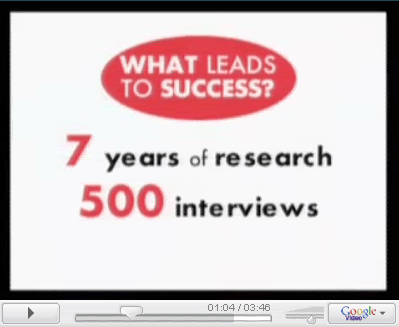Dear Friends,
If you had to start your business all over again what one thing you would do differently?
What one thing?
What have you learned at this point in your career that you would do differently if you had to start all over again?
In a survey of experienced sales people throughout the country in the real estate, mortgage lending, insurance and financial planning industries a commonality was uncovered.
Those surveyed had a minimum of 10 years experience and more than half had 20 years or more.
Most had experienced at least two market cycles.
What's a market cycle?
A Market cycle is a big change in the market brought about by external conditions.
By example:
1974-1979 - Market Up
Early 70's "recession" over; looking good!
1980-1983 - Market Down
Fed usury ceiling deregulated 18% rates; birth of Fannie Mae
1984-1989 - Market Up
First big boom; rates down to 10%
1990-1995 - Market Down
Negative impact; Tax Recovery Act of 1987; "bubble burst"
1995-2005 - Market Up
Longest upswing; low interest rates; world migration to USA; high demand housing
2006 - present - Uncertainty in housing market;
2008 - National home sales slump; prices fall;foreclosures rise to unprecedented levels; bottom is near. What goes down goes up!
Can you see it? A cycle.
A market cycle changes the way one approaches the business.
Some react. Some respond.
Those who react usually panic and consequently fail.
Those who respond have prepared for the changes, when preparing was out of favor.
Two things happen psychologically. First, when things go up people feel they'll never stop. Second, when things go down people think they'll never stop.
Read that again. Now think about it. This more than any other factor effects how we approach cycles.
What is important to remember about market cycle changes?
The major cause attributed to each major change is from an unforeseen, didn't see that coming, external force. Although the forces that create the change are new the cycle of up's followed by downs and downs followed by up's are not.
Put it this way, "every era of prosperity is followed by an era of decline and every era of decline is followed by an era of prosperity." ~ I Chin, 3000 BC
This is nothing new.
The only uncertainty is the frequency of the cycle.
Back to the question.
As we listened and recorded the answers to the survey question, it became obvious that one single common response was shared by nearly all respondents.
It didn't matter where they worked, what industry they were in, male or female, educated or not, which generation they were from, or which two market cycles they experienced.
They all experienced to some degree, the same confusion, chaos, panic, uncertainty, change, newness and unpredictability of the future when market cycles changed.
So, what did all these experienced sale professionals learn over time?
What one thing would they do differently if they had to start their business all over again?
It is summed up with one response.
"I would have kept all the names and addresses of all the people I met and did business with over the years and I'd be in contact with 3000 people a month instead of trying to find 300 today."
That's it!
DATABASE
AKA - Sphere of Influence or Referral Network; Client Community; people who know you, like you, trust you; Relationship Marketing; After-marketing; customer contact.
Call it what you want.
The most common response to the question was. "I would have kept in touch with a lot more people than I do now."
Why? Maybe because referral sources don't change because the market does. It's the changeless core" in an ever changing market place.
What people think of you, the ones who know you, doesn't change because the refinance market tanked or the housing market has an increasing supply.
More than any other single activity, DATABASE MARKETING is the most contributing factor in creating, maintaining and enhancing a long term referral business.
The physical activity of constant long term contact usually matches the mental outlook.
Let me go over that again.
Salespeople who regularly send some form of direct mail to the same group of family, friends, customers (sphere of influence), month after month, year after year, are looking for the long term relationship, repeat business and referrals from their groups.
What we discovered was that their mental outlook paralleled their physical marketing activities.
When they stopped their direct mail contact they in time stopped their positive long term outlook for market opportunities and slowly left the business.
They stopped what worked.
DATABASE MARKETING is more, much more, than an activity. It is the basis for a long term view.
This is why salespeople who have successfully endured changing markets and have reached a consistency in production and sale achievement often self admittedly say they are not the smartest or the best or do anything really different yet they succeed while others don't.
At a recent seminar a Realtor shared his story. He had been sending information via direct mail 6 times a year to the same database of 800 families for the past 10 years. He is a top producer by any industry standards. He is in the top 5% of his field.
When I asked how he would characterize himself, as outstanding, very good, above average, or just average his response was... just average.
75% of his business was from or referred by his database.
Database Marketing makes the ordinary EXTRAORDINARY.
That's my point.
A referral is a business opportunity initiated by a third party.
Get in touch, stay in touch, with your referral network.
Here are the 6 best Referral Sources.
1. People in your personal sphere of influence; i.e.: friends,
family, neighbors as well as your business and professional
sphere of doctors, lawyers, mechanic, vet, etc.
2. Satisfied clients
3. People whose business benefits from your business
4. People to whom you have given referrals
5. Anyone who has given you a referral
6. Referral business groups
The benefits of a successful ongoing database:
It works while you are not.
Your mental intentions match your physical action.
You build equity with the people, who know you, like you, and trust you.
It trumps experience in a fast and ever changing market place.
You do not have to be great to be greatly successful.
BE EXTRAORDINARY!
The best is yet to be!
Jeffrey Stanton ITI, CNE, WOW
Your Trusted Advisor For Life
347-466-3047
One of the fastest ways to build a successful referral based business is by training. Now, with me, I like to invest significant time immersing myself in training, while some people prefer to take it in bite-size chunks. Whatever your preference is, now is the best time to contact me.
If you have found this tip useful, please share it with any friends, family, colleagues and associates who you think will be interested. Feel free to print it (with credit and subscription information) and continue to enjoy the tips. I am always grateful for any comments, criticisms or other feedback that you may have. Please send them to feedback@jeffreysjournal.com


































No comments:
Post a Comment